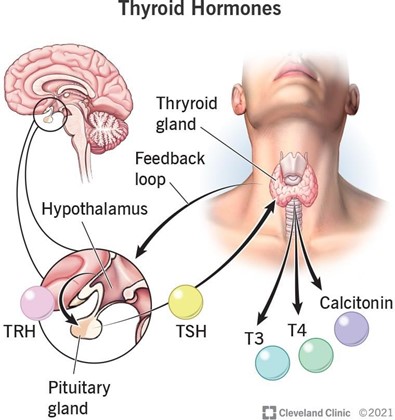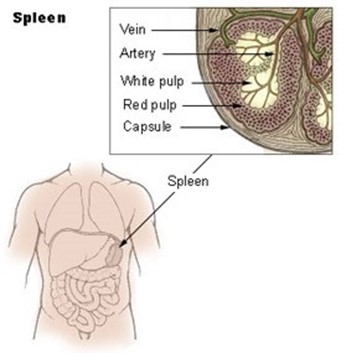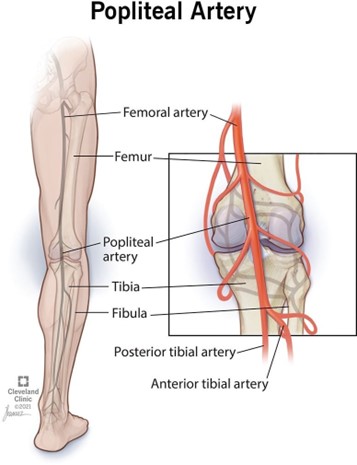The Thyroid gland secretes?
adrenaline.
insulin.
triiodothyronine.
parathyroid hormone.
The Correct Answer is C
The thyroid gland secretes triiodothyronine (T3), which is one of the two main thyroid hormones that affect almost every physiological process in the body.

T3 is the more metabolically active hormone produced from thyroxine (T4), which is the other thyroid hormone.
Choice A is wrong because the adrenal gland secretes hormones such as cortisol, adrenaline, and aldosterone, which are involved in stress response, blood pressure regulation, and metabolism.
Choice B is wrong because the pancreas secretes hormones such as insulin, glucagon, and somatostatin, which are involved in blood glucose regulation and digestion.
Choice D is wrong because the parathyroid gland secretes parathyroid hormone (PTH), which is involved in calcium and phosphate homeostasis.
Normal ranges for T3 levels vary depending on the laboratory and the method of testing, but they are usually between 100 and 200 nanograms per deciliter (ng/dL) for total T3 and between 2.3 and 4.2 picograms per milliliter (pg/mL) for free T.
Nursing Test Bank
Naxlex Comprehensive Predictor Exams
Related Questions
Correct Answer is A
Explanation

It is a major component of the lymphatic system and contains T and B lymphocytes.
Choice B is wrong because the spleen does not produce T lymphocytes, but rather stores them.
T lymphocytes are produced in the thymus.
Choice C is wrong because the spleen does not filter lymph, but rather blood. It traps bloodborne microbes and produces an immune response to them.
Choice D is wrong because the spleen consists of one lobe and is located in the upper left abdomen below the diaphragm.
The description in choice D matches the thymus, not the spleen.
The normal size of the spleen in adults is about 12 cm long, 8 cm broad, and 3-4 cm thick, weighing about 200 g.
The normal range of splenic index (the product of length, width, and thickness) is 120-480 cm.
Correct Answer is C
Explanation
The popliteal artery is a continuation of the femoral artery that runs through the back of the leg and the knee.

It is located in the popliteal fossa, a hollow space behind the knee. The popliteal pulse can be felt behind the knee.
Choice A is wrong because the thymus is a gland in the chest, not in the leg.
Choice B is wrong because the liver, spleen, and upper gastrointestinal tract are organs in the abdomen, not in the leg.
Choice D is wrong because the colon and rectum are parts of the large intestine, not the leg.
Whether you are a student looking to ace your exams or a practicing nurse seeking to enhance your expertise , our nursing education contents will empower you with the confidence and competence to make a difference in the lives of patients and become a respected leader in the healthcare field.
Visit Naxlex, invest in your future and unlock endless possibilities with our unparalleled nursing education contents today
Report Wrong Answer on the Current Question
Do you disagree with the answer? If yes, what is your expected answer? Explain.
Kindly be descriptive with the issue you are facing.
